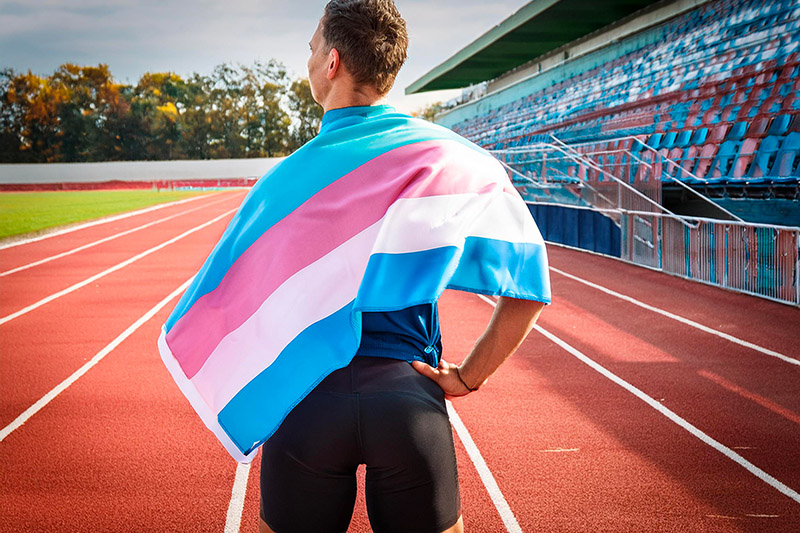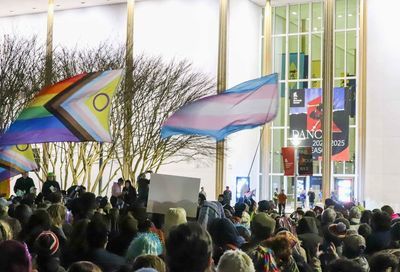Seven Republican states are pushing a new wave of anti-trans bills
Republicans, seeking to rile up social conservatives ahead of the midterm elections, are pushing forward with a second wave of anti-trans legislation.

In 2021, more than 268 anti-LGBTQ bills, and, specifically, 147 anti-transgender bills, were introduced in more than three dozen state legislatures, with 26 anti-LGBTQ measures eventually being enacted into law in 10 states. But even though it’s only two weeks into 2022, Republican lawmakers, in particular, seem determined to continue the push for anti-LGBTQ measures as they seek to stir up conservative voters ahead of this year’s midterm elections.
Thus far, Republicans in seven different states have introduced at least nine measures targeting transgender and nonbinary youth, including bills to restrict transgender athletes from participating on sports teams matching their gender identity, prohibit them from receiving gender-affirming medical care such as hormones or puberty blockers, or bar them from gender-specific facilities that don’t match their assigned sex at birth.
Thus far, the states that have introduced such bills are Arizona, Alabama, Indiana, Kentucky, Oklahoma, New Hampshire, and South Dakota. Other states, particularly those controlled by Republicans where anti-LGBTQ laws did not pass last year, are expected to introduce and pass similar bills in the coming months.
“Unfortunately, I think we’re getting ready to watch a race to the bottom among legislators who are in a competition to see who can do the most harm to trans kids,” Gillian Branstetter, a trans advocate and the media manger for the National Women’s Law Center, told NBC News. “It is a hostile and dangerous trend that I’m sure we’ll see continue through the year.”
Last year, two states, Arkansas and Tennessee, passed bans on access to gender-affirming care for minors identifying as transgender or nonbinary. Arkansas’ law has since been blocked from being enforced by a federal judge. Both states also passed bans on transgender athletes that prevent them from participating in sports based on their gender identity.
Six other states — Alabama, Florida, Mississippi, Montana, Texas, and West Virginia — passed transgender athlete bans through legislation. Idaho previously passed a ban back in 2020, which has since been challenged in the courts.
South Dakota Gov. Kristi Noem (R) vetoed a ban she worried might leave the state vulnerable to being penalized by the NCAA, the governing body in college athletics, but signed two executive orders restricting trans athletes’ ability to compete at the elementary and secondary levels, and at the collegiate level. This year, Noem has revisited the issue, pushing her own version of a transgender athlete ban that would enshrine her executive orders into law.
While polling shows that many Americans oppose allowing transgender females to compete in women’s sports, another poll from PBS, National Public Radio, and Marist College last year also indicated that two-thirds of Americans, including 66% of Republicans, oppose the types of bans being passed by various state legislatures.
Additionally, a 2020 poll of voters in 10 swing states found that the importance of pushing for such bans was the least important policy priority for most Americans, with only 1% to 3% saying the issue should be prioritized.

Noem, who has future presidential ambitions, recently released a national TV ad touting her efforts to bar transgender female athletes from women’s sports in the name of “fairness.” The Human Rights Campaign, the country’s top LGBTQ advocacy organization, denounced Noem’s ad as “discriminatory” and accused her of “eras[ing]” and “dehumaniz[ing]” transgender people in order to score political points and win accolades form social conservatives.
“Prohibiting transgender girls from participating in school athletics alongside their peers is a radical political talking point — one that Noem is using to advance her national political ambitions, but which does not serve South Dakota’s best interests,” HRC Interim President Joni Madison said in a statement. “At stake is the safety of transgender young people, who are facing increased discrimination in their communities, last year leading to the highest incidence of fatal violence against transgender and gender non-binary people on record.
“Noem’s ad resorts to attacking children in service of a divisive and discriminatory political agenda,” added Madison. “Every child deserves to be lifted up and supported by their leaders and their government, not targeted and dehumanized. Legislators must reject this divisive bill to avoid tarnishing South Dakota’s reputation and hurting kids in service of Governor Noem’s selfish political gamesmanship.”
Also in South Dakota, lawmakers are pushing a bill to block transgender students from using multi-occupancy shower rooms, restrooms, or locker rooms. As part of that measure, students would be able to sue their local school district if they encounter a trans student using multi-person facilities, or if a teacher allows a transgender student to use even a single-stall restroom that is designated for use by a gender that does not match their assigned sex at birth.
In Virginia, where Gov.-elect Glenn Youngkin (R) campaigned against Virginia Department of Education guidelines that recognize the gender identity transgender and nonbinary students, including requiring teachers and administrators to use a student’s preferred pronouns, a Republican state senator has introduced a bill to repeal the requirement that school districts implement those guidelines. However, because Democrats still retain control of the State Senate — at least until 2023 — that measure is unlikely to pass.
But LGBTQ advocates warn that merely introducing bills that target the transgender community can generate a poisonous atmosphere that harms transgender youths’ sense of self-worth and may lead to mental health issues, depression, increased anxiety, or even suicidal ideation.
A new survey from The Trevor Project, the top crisis intervention and suicide prevention organization serving LGBTQ youth, shows that 85% of transgender or nonbinary youths report their mental health was negatively affected by debates over legislation seeking to exclude or erase transgender individuals from the public sphere — regardless of whether those bills actually passed.
Branstetter told NBC News that the parade of anti-trans legislation — particularly this latest wave, in which lawmakers are often doubling down on bills that failed to pass last year — can lead to a sense of hopelessness and despair among transgender individuals who see nearly every aspect of their ability to live their lives as they see fit targeted.
“It’s very dark, and there’s a strong sense among trans people that we are having the door slammed in our face just as we got our foot in the door,” she said.
Support Metro Weekly’s Journalism
These are challenging times for news organizations. And yet it’s crucial we stay active and provide vital resources and information to both our local readers and the world. So won’t you please take a moment and consider supporting Metro Weekly with a membership? For as little as $5 a month, you can help ensure Metro Weekly magazine and MetroWeekly.com remain free, viable resources as we provide the best, most diverse, culturally-resonant LGBTQ coverage in both the D.C. region and around the world. Memberships come with exclusive perks and discounts, your own personal digital delivery of each week’s magazine (and an archive), access to our Member's Lounge when it launches this fall, and exclusive members-only items like Metro Weekly Membership Mugs and Tote Bags! Check out all our membership levels here and please join us today!


























You must be logged in to post a comment.